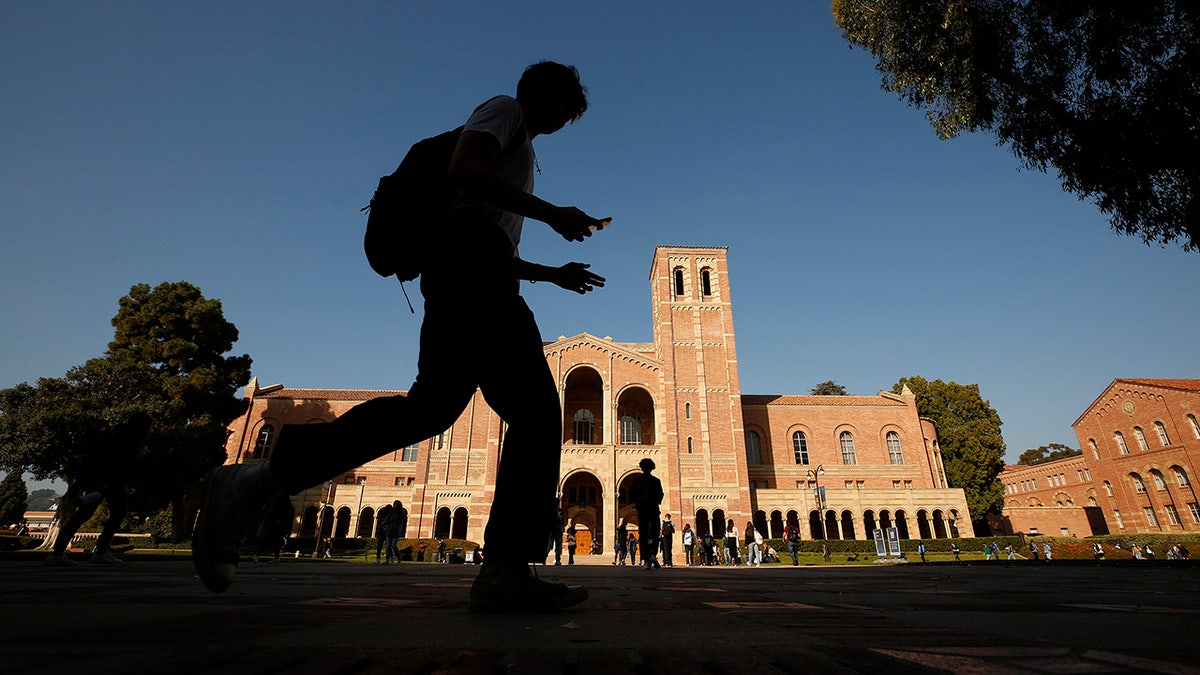George Mason University students win lawsuit after speaking out against school

Two George Mason University (GMU) law students won a lawsuit on Friday after they faced no-contact orders from school officials for speaking out against a proposal for feminine hygiene products to be included in male restrooms.
“Universities—especially law schools—should be places of debate and discussion, and GMU has shown its commitment to this ideal with the settlement it reached with Selene and Maria,” said Alliance Defending Freedom (ADF) Senior Counsel Tyson Langhofer, director of the ADF Center for Academic Freedom.
The conservative law firm sued GMU in federal court for enforcing its Title IX and Office of Diversity, Equity, & Inclusion sexual harassment policy against Selene Cerankosky and Maria Arcara.
ATTORNEY SAYS ‘A LOT OF TEACHERS COMING TO US’ AFTER THEY ARE BEING FORCED TO USE STUDENTS’ PREFERRED PRONOUNS
Campus of George Mason University, Fairfax, Virginia. (Robert Knopes/UCG/Universal Images Group via Getty Images)
Cerankosky and Arcara, third-year students at Antonin Scalia Law School, were participating in a classroom online chat in September, in which they addressed another student’s proposal for GMU to allow tampons in the men’s restroom.
According to the lawsuit, Cerankosky pushed back saying, “allow[ing] biological females into male restrooms to access period products as ‘trans men,’ then that would mean ‘female bathrooms will welcome male occupants.’”
Cerankosky explained further that she wanted her classmates to “‘recognize the concerns of biological female students’ and how they would feel ‘considerably uncomfortable if there are males using private women’s spaces on campus.’ She noted that ‘[w]omen have a right to feel safe in spaces where they disrobe.’”
“Ms. Arcara only posted twice during this conversation to ‘agree with [Ms. Cerankosky]’ and to highlight her concerns for her own privacy and safety “if a biological man is in the [bath]room with [her] at a vulnerable time,’” the lawsuit stated.
LOCAL VIRGINIA TEACHERS NO LONGER FORCED TO USE STUDENTS’ PREFERRED PRONOUNS AFTER SETTLEMENT

Two George Mason University (GMU) law students won a lawsuit after they were penalized for speaking out against feminine hygiene products being used in male restrooms. (Al Seib / Los Angeles Times via Getty Images). (Al Seib / Los Angeles Times via Getty Images)
Cerankosky’s criticisms of tampons in the private student group chat room prompted GMU to issue no-contact orders against the two students, “without any explanation or warning,” prohibiting them from having any contact with other students.
The settlement resulted in $15K in damages for the students and attorneys’ fees as well as GMU agreeing to change their policy to ensure that no-contact orders are used to “suppress, coerce, or punish” free speech rights.
GMU sent the following statement to Fox News Digital in response to the settlement.
“George Mason University is pleased to have resolved Cerankosky et al v. Washington et al.,” a GMU spokesperson told Fox News Digital.
“The resolution will result in an improved process at George Mason for determining how and when no-contact orders are issued as supportive measures in the Title IX Process. Per the applicable Title IX Regulations, mutual no-contact orders are considered non-disciplinary supportive measures and are used by George Mason to restore or preserve equal access to the university’s educational programming.”

The settlement resulted in $15K in damages for the students and attorneys’ fees as well as GMU agreeing to change their policy to ensure that no-contact orders are used to “suppress, coerce, or punish” free speech rights. (MediaNews Group/Boston Herald via Getty Images)
CLICK HERE TO GET THE FOX NEWS APP
The GMU spokesperson explained further that some of the improvements to GMU’s procedures for no-contact orders issued in Title IX matters are “establishing clear criteria for when no-contact orders can be issued, setting a duration of an academic year for no-contact orders with the ability to renew them as needed, providing a process for recipients of no-contact orders to appeal the order and to present arguments regarding the no-contact order to the appeal officer.”
The GMU official proceeded to say, “Under these revised procedures, George Mason will continue to provide supportive measures, including no-contact orders where appropriate, to address allegations of sexual misconduct and preserve equal access to the university’s educational programming. These new procedures also reaffirm George Mason’s strong commitment to freedom of expression and the importance of open dialogue and debate across differences.”





